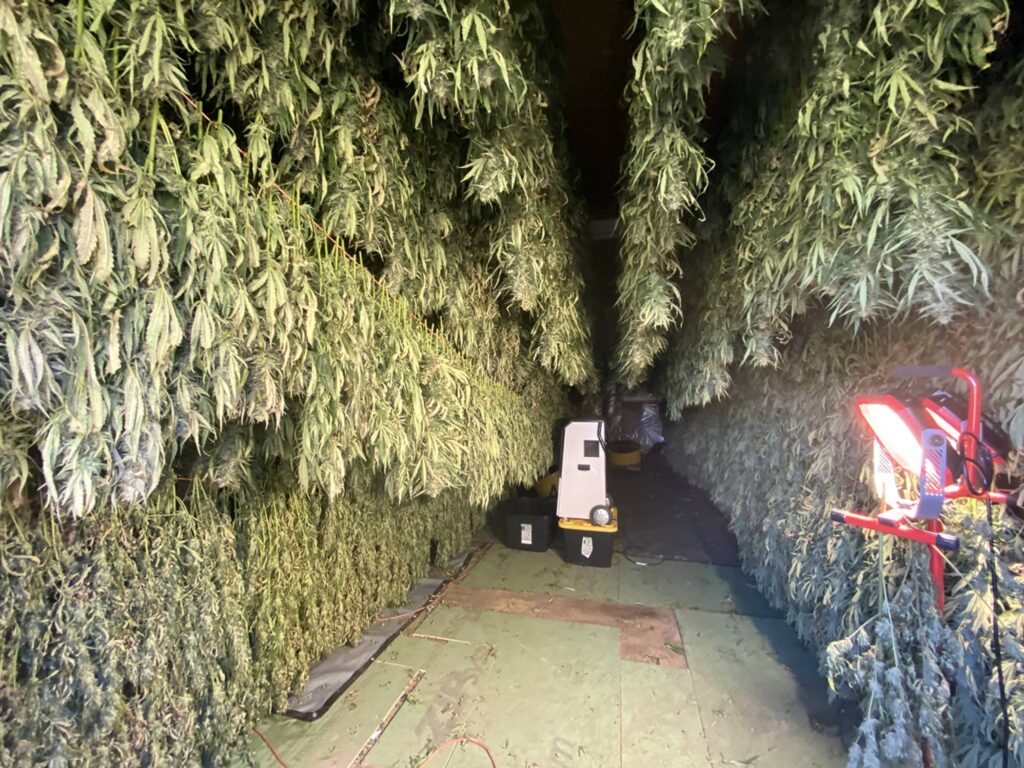Unsold cannabis in New York state will likely be thrown away because of a lack of retail locations. Fresh Alternative Farms
Three years after New York approved recreational cannabis use for adults 21 and older, the rollout of the Empire State’s legal-cannabis program has created a bottleneck of product with limited options to get it to market, people directly involved in the business told MarketWatch.
New York state has only opened about 50 legal stores, yet state-legal cannabis farmers grew enough product this past summer and fall to supply up to 1,500 stores, a consultant who works in the industry said.
“I have clients that have spend $1 million on their cannabis cultivation and only sold a fraction of it,” said Jonah Helmer, a co-founder of the cannabis-agriculture consultant Fresh Alternative Farms LLC. “We haven’t seen anything to help the farmers.”
Across the state, at least 250,000 pounds of cannabis — worth about $27 million, plus an additional $10 million in tax revenue — remain unsold, Helmer said. The state’s 270 conditional cultivators and 40 processors urgently need to find a way to legally sell the crops and cannabis products, or they’ll have to throw them all away, he said.
In one case, he added, a big field in upstate New York produced 1,000 pounds of cannabis valued at $300,000, or $300 a pound, but none of it was sold.
“These cultivators are struggling,” Helmer said. “For many of them, if they don’t break even this year, they’re done.”
The press office for the New York Office of Cannabis Management did not respond to emails from MarketWatch. In a separate statement Monday, the OCM said it had seized $3.39 million worth of cannabis from illegal shops in January after conducting 60 inspections and 20 reinspections.
The OCM continues to work to “deter illicit activity and facilitate the growth of a legal market,” it said in a statement made in connection with the illegal-cannabis seizures. Gov. Kathy Hochul has proposed strengthening enforcement authority to speed up the closure of unlicensed businesses and establishing local registries of licensed cannabis businesses to assist and empower local governments, including New York City, to padlock unlicensed business, the OCM said.
The office also said Monday it would open the 50th brick-and-mortar store under its conditional adult-use retail dispensaries program, known as CAURD, on Tuesday, calling it a “significant” milestone in the state’s program. The store will be operated by Kelly Hilland, an entrepreneur and service-disabled veteran, and will be the first dispensary in the state to be majority owned by a Black woman, according to the OCM.
The lack of sales outlets is due to variety of factors, including a relatively small number of permits, economic headwinds and challenges in buying or renting real estate for stores.
But if the state were to issue more licenses to retail-store applicants that have lined up real-estate locations, the current situation could be improved to some extent, Helmer said.
The state sponsored a Cannabis Growers Showcase program over the summer and fall as a place for farmers to sell cannabis, but the program has since ended.
Meanwhile, the illicit market continues to thrive, with thousands of unlicensed shops.
While the state has issued 460 retail licenses to nonprofits and people displaced by the war on drugs under its CAURD program, it’s been difficult for most licensees to find real estate and come up with the capital to open stores.
From the archives (September 2023): Medical-cannabis companies blast New York for ‘clear course for failure’ in state pot-business rollout
In order to issue more permits to non-CAURD applicants with commercial businesses in the works, the Office of Cannabis Management held an application process late last year, with a deadline of Nov. 17.
Among the roughly 1,500 applicants was the Highline Cannabis, a legal cannabis business.
Jake Reinus, the chief executive and general counsel of the Highline Cannabis, said about 700 of the 1,500 applicants had potential real-estate locations lined up, but the state had not provided many of them with licenses.
Instead of awarding 700 or more licenses to the current crop of applicants, the state has said it plans to award 250, a number Reinus and others say is too low considering the current oversupply situation.
“The recent announcement by the OCM it intends to issue only 250 licenses to the nearly 1,500 applicants who have control over a location, and then to not even review the remaining applications is illogical,” Reinus said in an email to MarketWatch. “These are the businesses that are most prepared to serve the industry and its immediate needs. Moreover, this decision is highly misleading in light of the OCM’s earlier announcement that applicants with proof of control of a location would receive priority review.”
Josh Elyachar, co-owner and operator of the Highline Cannabis, said every retail-license applicant with a location lined up should get a license from the state.
“The problem could be [solved] with a signature today,” Elyachar said. “New York state is losing out on millions in taxes and more legal jobs. It’s like the state is punishing people that are playing by the rules.”
The Highline Cannabis searched for a location in affluent Westchester County for about 15 months with three different real-estate brokers. The company made a dozen offers before finding a potential place.
“Unwilling landlords” and “unwilling and unqualified real-estate brokers” are to blame, while some landlords simply cannot lease to these businesses because they have federally backed mortgages on their properties, Reinus said. Cannabis remains illegal at the federal level.
Overall, New York’s licensed cannabis market generated only $150 million in sales in its first year of operation in 2023 — less than the $274 million generated by the much smaller state of Connecticut, which also kicked off adult-use sales about a year ago.
H/T: www.marketwatch.com



